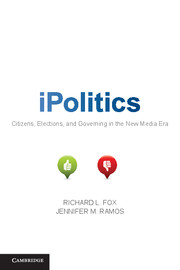Book contents
- Frontmatter
- Contents
- List of Tables and Figures
- Contributors
- Preface and Acknowledgments
- Introduction
- Section I The Shifting Media Universe and News Consumers
- 1 More Sources, Better Informed Public? New Media and Political Knowledge
- 2 Rethinking Television's Relationship to Politics in the Post-Network Era
- 3 Interplay
- Section II Campaigns and Elections in the New Media Environment
- Section III Civic Mobilization and Governance in the New Information Age
- Index
- References
1 - More Sources, Better Informed Public? New Media and Political Knowledge
from Section I - The Shifting Media Universe and News Consumers
Published online by Cambridge University Press: 05 June 2012
- Frontmatter
- Contents
- List of Tables and Figures
- Contributors
- Preface and Acknowledgments
- Introduction
- Section I The Shifting Media Universe and News Consumers
- 1 More Sources, Better Informed Public? New Media and Political Knowledge
- 2 Rethinking Television's Relationship to Politics in the Post-Network Era
- 3 Interplay
- Section II Campaigns and Elections in the New Media Environment
- Section III Civic Mobilization and Governance in the New Information Age
- Index
- References
Summary
In fall 1993, early in President Bill Clinton's tenure, he proposed a major overhaul of the nation's health care system. Debate over this proposal received sustained attention from media organizations throughout 1994 until congressional leaders announced that the reforms did not have enough support to pass. Fast-forward 15 years and a similarly high level of attention was placed on President Barack Obama's attempt to reform the health care system. Again, a rancorous political debate broke out, and intense media attention and scrutiny followed.
These two health care policy debates occurred in considerably different media environments. To keep on top of political developments in 1993, most Americans relied on ABC, CBS, or NBC evening news broadcasts, daily newspapers, or both. Some consulted cable television channels, radio, and newsmagazines for political news, although these media audiences were considerably smaller than for network television and newspapers. An important development in radio had been the resurgence of political radio, or talk radio. Rush Limbaugh, a conservative who had frequently criticized Clinton's health care reform proposals, hosted one of the most popular talk radio shows in the nation.
- Type
- Chapter
- Information
- iPoliticsCitizens, Elections, and Governing in the New Media Era, pp. 25 - 47Publisher: Cambridge University PressPrint publication year: 2011
References
- 1
- Cited by



